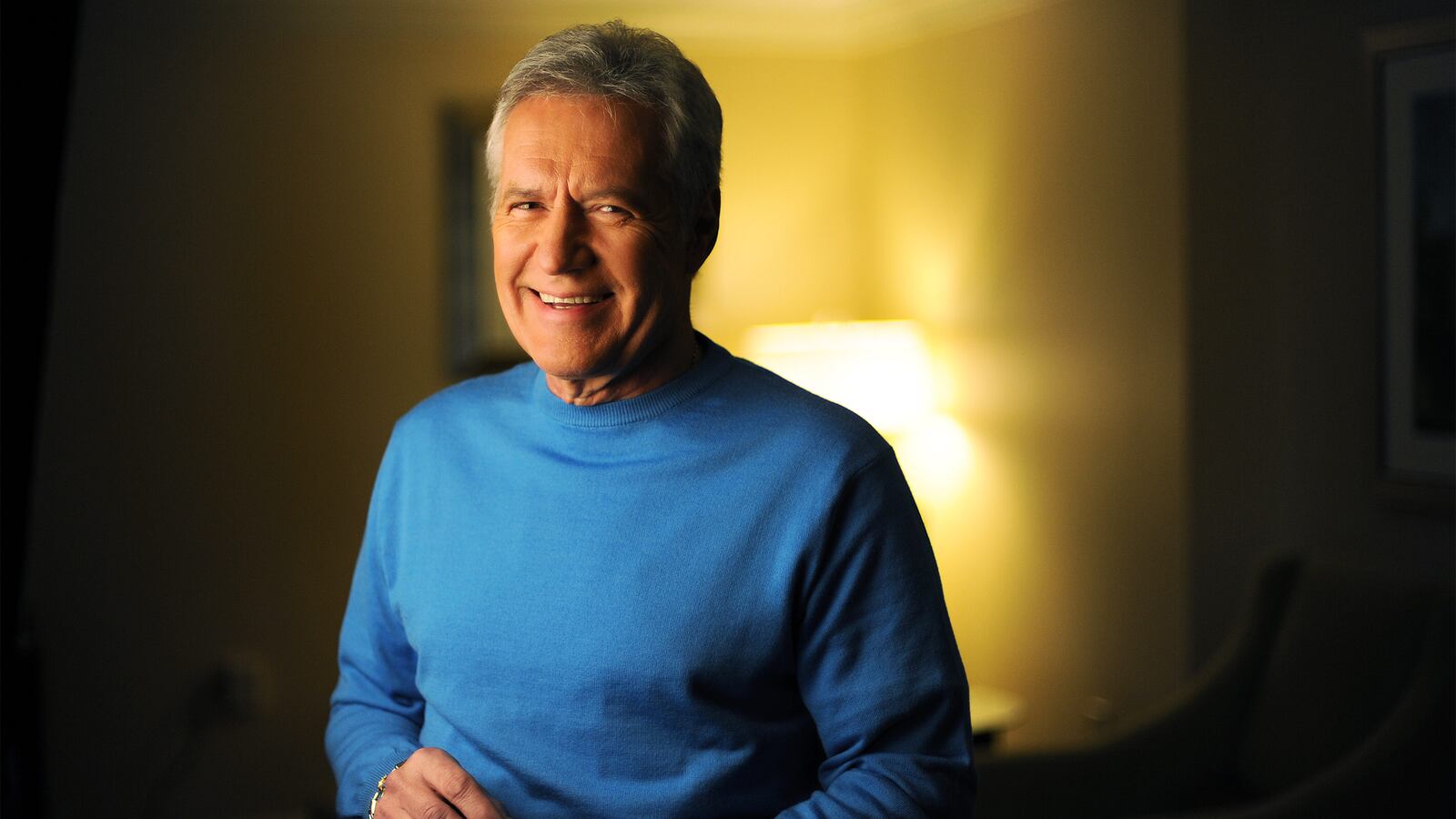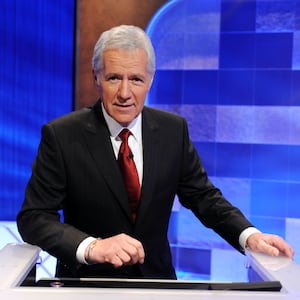What was it about Alex Trebek? For more than 35 years, the dry-witted Jeopardy! host beamed into living rooms across America with a simple but precious goal: celebrating knowledge for knowledge’s sake. In doing so, he became something of a paternal figure—a wonk with a dry sense of humor who, for 30 minutes each weeknight, really wanted us to remember our European history.
On Sunday Jeopardy! announced that Trebek had died after a long, public battle with stage IV pancreatic cancer. He was 80 years old, and had been open about his grueling health struggles. Even so, he filmed 35 new episodes in the week before his death. (The final installment is set to air on Christmas.) It didn’t take long after Trebek’s death for the tributes to begin pouring in, as Jeopardy! players and fans alike looked back on his indelible impression on the culture—and the enigmatic persona that helped fuel it.
“He was on your side, you know?” former Jeopardy! champion Buzzy Cohen told The Daily Beast. “He wasn’t trying to increase the pressure; he wasn’t trying to trick you. He wanted you to get it.”
Trebek’s on-air personality was always something of a paradox, as though a perpetually furrowed brow had somehow managed to manifest both sentience and a sense of humor. He wanted the show to be all about the contestants, Cohen said, and had an exacting eye. (“If a clue was written in a funky way, he would insist on the writers making it better.”) Even as Trebek became a syndicated legend, one got a sense of the idiosyncratic depths that laid beneath the crisply ironed suits.
Arthur Chu recalls one moment that reshaped his understanding of Trebek forever. “Alex Trebek once shared a story with us about how he wasn't really much of a trivia guy himself in his youth and was, in fact, a hockey player,” Chu wrote to The Daily Beast. “And that one of the problems with playing Jeopardy! was there was no opportunity to vent your frustration when the game was going poorly with a ‘good, hard, check into the boards.’”
“I’ve never been able to watch the show the same way since,” Chu wrote.
Under Trebek’s stewardship Jeopardy! flourished into a ubiquitous syndicated phenomenon—a cerebral counterpart to its more colorful, less pensive older sibling, Wheel of Fortune, but with the hushed gravitas of NPR.
Perhaps it was appropriate that he hosted a show geared toward know-it-alls, Trebek himself remained somewhat unknowable—at least to those of us who watched him on-screen. But the players who met him in person all all touched on a common theme: For all that professorial sternness, Alex Trebek loved to have fun.
Those who’ve spent decades watching Jeopardy! have certainly witnessed Trebek’s humorous streak. Buzzy Cohen brought it out when he made his debut on the quiz show back in 2016—and tore fans apart with his shoulder-brushing, hair-slicking antics. One of the champ’s best and most controversial maneuvers: betting nothing on Final Jeopardy so he could imitate Darrell Hammond’s Sean Connery from Saturday Night Live with sassy answers instead. (Example: “Who is you aren’t rid of me yet, Trebek?”)
After his first sarcastic answer, Cohen recalls checking in with Trebek to make sure he knew it was just all a joke. “He was like, ‘No, it’s great; I love it,’” Cohen said. “I think he loved being in on the joke.”
Trebek even came up with a way to extend the bit. In 2018 when Cohen popped into the studio audience with a friend, he’d brought along the wrestling belt his wife had made him for Hannukah to show the producers. But Trebek came up with an even better idea—panning the show’s cameras to Cohen in the audience and sarcastically introducing him as the most “self effacing” Jeopardy! champ. “That,” Cohen insists, “was all him.”
There was also the 2017 Tournament of Champions, where Cohen, Austin Rogers, and Alan Lin replaced the show’s usual, traditional smile-and-wave introductions with a coordinated pantomime—and Trebek joined in without missing a beat. “He just saw it on the monitor and immediately jumped in and wanted to have fun with us,” Cohen said.
“It’s sometimes kind of hard for people to do both,” Cohen added. “You get the jokesters who can’t just focus and play the game—or you get people who are, you know, treating it like the foreign service exam.”
That said, Trebek had no problem putting people in their place when he deemed fit. Canadians might be the ultimate nice guys in the American imagination, but Trebek never hesitated to gently razz contestants when they missed a certain kind of question. For instance: Remember that time he mercilessly roasted a trio of nerds for being collectively unable to answer a single sports query?
That edge, like Trebek’s humor, apparently grew more pronounced once the cameras were off. Colby Burnett, expressive AP history teacher and 2013 Tournament of Champions winner, looks back with fondness on the time Trebek completely shut him down in just one sentence.
“I had answered a question about cheese,” Burnett wrote in an email. “Alex casually remarked, ‘There’s a Colby cheese!’ Having been ridiculed for this coincidence throughout my childhood, I threw up finger guns, pointing at him, sarcastically stating, ‘Never heard that before, Alex!’ A withering glance from him ended that moment.”
During commercial breaks, as Trebek and the production team chatted with the studio audience and answered questions, “Someone asked... about contestant etiquette,” Burnett wrote. “He softly stated three directives, the third glancing over his shoulder, looking directly at me: ‘And you are *not* to accost the host.’”
“And that was that.”
Burnett compared Trebek’s demeanor on Jeopardy! to his own as an educator. Like Cohen, he emphasized that above all Trebek wanted his contestants to succeed—“encouraging them if they were doing well and/or lightly chiding them if they faltered, all the while maintaining a constant sense of professionalism.”
Whatever it was—his dignified, scholastic manner or his stature as America’s nerdy godfather (grandfather? uncle?)—Trebek’s impact is as immeasurable as it is undeniable. And to hopeful contestants, many of whom had grown up watching him, Trebek’s approval was its own honor. Just ask David Madden, who taped his first episode back in December of 2004.
Madden was 23 years old when he first competed, a fact he’d shared with Trebek when asked. After taping a run of five episodes in one day—Jeopardy!’s typical production clip—“Alex looked straight into the camera and said, ‘The kid is good!’” Madden recalled in an email. “I’ve often thought I’ll use that as my epitaph one day; it doesn’t get much better than being complimented by Alex on national TV.”
Among other things, the past two decades have brought with them an increasingly toxic public discourse. And although plucky characters like Cohen and Rogers have been credited with ushering in a sort of Jeopardy! renaissance among millennials in recent years, this milieu also feels crucial to understanding the show’s popularity in recent years—and Trebek’s broader legacy. At a time when even basic facts have become subject to political debate, there’s something comforting about a cerebral show that, for three decades running, has chosen substance over style—knowledge over flash.
It was Trebek who set that tone, and Trebek who saw it through for as long as he could. As Burnett put it in his email, “It’s a different person who hears that he has one, perhaps two years to live and continues to come to work every day that he can.”
Our culture often fixates on those who push through difficulties like these to continue doing important work—an inclination that, at times, overlooks the humanity and value of others whose physical limitations simply will not accommodate such ambitions. But the most remarkable thing about Trebek’s public battle with cancer was never his perseverance; it was the candor with which he addressed it.
Speaking with Good Morning America last May, Trebek explained the emotional toll his cancer battle was taking: “I have had kidney stones, I have had ruptured disks, so I am used to dealing with pain,” he said. “But what I am not used to dealing with is these surges that come on suddenly of deep, deep sadness. And it brings tears to my eyes.”
“Chemo affects people in different ways, and people have to understand that,” he added. “There is nothing wrong with saying, ‘Hey, I am really depressed today and I have no idea why. Why am I crying today?’ ... I go in and I sit down, I joke with the nurses and I am there for an hour and a half while they inject all this stuff into me. Then I go home and I have a good day. Then the next day for no reason that I can fathom, it turns south on me. But that’s OK.”
In a recent, moving column about how Jeopardy! helped him through his longtime depression, Cohen captured the unique impact of seeing a figure like Trebek describe his depression so plainly. “His frankness and plain-spoken, direct manner opened a door for all of us,” Cohen wrote. “Trebek always seemed to have the answers, and his vulnerability about his mental health normalized those struggles for the rest of us.”
That honesty was just one more example of Trebek’s grace—as a performer, a public figure, and human being. He might be Jeopardy!’s second host after the original show’s announcer, Art Fleming, but his reboot eclipsed its progenitor and became a phenomenon all its own. He might have been unknowable to all of us, but he also knew how to make us feel like we knew him. Cohen put it best: “He rose to Jeopardy!, and Jeopardy! rose to him.”


